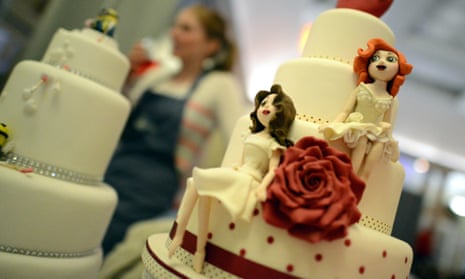The US supreme court ruled last summer that the national retail chain Hobby Lobby has the right to impose the religious beliefs of its owners on the company’s employees by refusing to cover contraception, as required by federal law. The court’s ruling rested on the premise that complying with the law violated the business’ religious freedom.
Since then though, in other contexts, lower courts and commissions have been stepping up and ruling against companies that try to use the freedom of religion argument as a pretext for discrimination against LGBT people and women.
Religious freedom is integral to this country. It must - and will – be protected. But what is being increasingly recognized is that religious freedom gives us all a right to our beliefs. This right, though, like all our rights, has limits. Those limits come into play when acting on our beliefs harms others.
Religious liberty can’t be used by businesses to turn away lesbian and gay couples seeking to celebrate a relationship, or by religiously associated nonprofits who treat women employees like second-class citizens by denying contraceptive coverage. The promise of equality is not real or robust if it has exceptions.
Just last week, a court in Washington found a florist in violation of that state’s anti- discrimination law after the store refused to provide flowers for a gay couple’s wedding. The owner of the store said serving the couple would have violated her faith by signaling approval for the wedding. The court said she’s welcome to have her beliefs. But those beliefs don’t give her the right to turn people away simply because they’re gay. The court also concluded that referring the couple to a non-discriminating business doesn’t cut it. Such a result, would “defeat the purpose of combating discrimination” and “allow discrimination in public accommodations based on all protected classes, including race”, according to the court.
The Washington court is not alone. In the recent wave of cases concerning businesses serving the public, every court and commission that has considered a claim that religious belief justifies discrimination has said, “No license to discriminate issued here.”
When a photography studio argued a right to refuse to photograph a commitment ceremony, the state supreme court in New Mexico said no. When a wedding venue argued for a right to turn away a lesbian couple, the New York State Division of Human Rights said no. When a cake shop argued a right to refuse service to a gay couple seeking a wedding cake, the Colorado Civil Rights Commission said no. And an administrative law judge in Oregon said no to a bakery that refused to provide a same-sex couple a cake for their wedding.
The trend, however, isn’t limited to the LGBT context. The courts are denying a new wave of challenges to the rules providing for contraceptive coverage. Right now, in essence, if those institutions object to providing contraception for religious reasons, they can notify their insurer or the federal Department of Human Services of their objection, and the insurer will provide and administer coverage. Religiously affiliated nonprofits are objecting even to this requirement, saying it makes them complicit in sin. To date, four courts of appeals have considered challenges to this rule; every one of those courts has rejected the claim.
The courts have rejected this effort to stretch the Hobby Lobby ruling one step further. At least one court has called it like it is, noting that what the institution is objecting to is not filling out paperwork. The real objection is women getting the contraceptive care they need.
The supreme court’s Hobby Lobby ruling was without precedent. For now at least, the courts and other governmental bodies aren’t accepting the invitations, coming fast and furious, to sanction the next wave of discrimination.
And they can’t, not if they want to be true to equality and religious freedom. When there were calls in congress and courts across the country to let businesses turn away African Americans because of religious beliefs, the answer was a resounding “no.” The answer should be the same today.
Businesses and nonprofits have twisted the idea of religious freedom, arguing that it provides the right to discriminate. They’d like the right to put up a big sign that says, “We don’t serve your kind here,” and claim that’s okay simply because of their religious beliefs.
The growing response from courthouses and government bodies has been a loud and clear, “No.” This shift promises that religious freedom will be protected – and the promise of equality will too.
